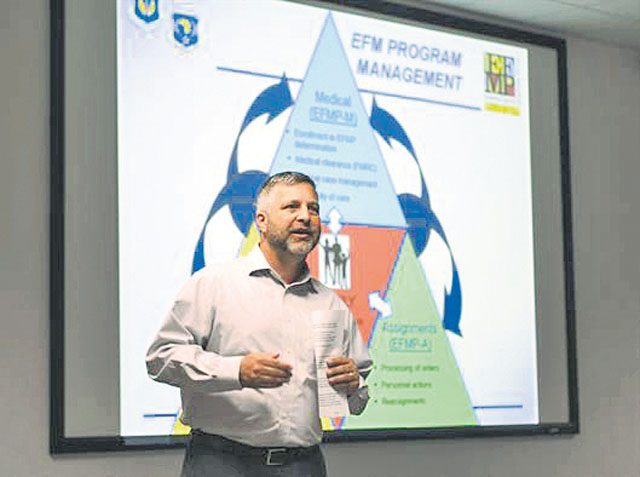
Ramstein’s observance of National Disability Employment Awareness Month, held every October, highlights the need to include the disabled — thousands who work in the Department of Defense — in the workforce.
“We all play an exceptional role in the jobs we are required to do, and everyone is equal no matter what the disability may be. We should have the understanding and the patience to respect and appreciate their contributions and understand that they can play a significant role just like anybody without a disability,” said Master Sgt. James Michael Brown III, Installation Deployment Reception Center aerial support function section chief.
Disabled people are a useful resource in labor and employment, Brown said.
“They all have unique capabilities, knowledge and education that we tend not to pay attention to just because they might have a physical defect,” said Brown, who serves as a representative for NDEAM. “If we see an individual with a deformity, we just automatically assume that they probably can’t have the same level of competence that we might have. So I think we need to reverse that mindset.”
Some of the tools used to raise awareness during NDEAM include an educational dialogue called Lunch and Learn, a 5-kilometer run and educational booths containing DVDs, books and biographies of famous public and historical figures with disabilities.
The educational booths were set up at places where large numbers of people would see them, such as the Kaiserslautern Military Community Center. Brown wanted the message of NDEAM to reach as many people as possible, saying the issue of disability employment should not be ignored.
“NDEAM is not really a popular month; not too many people even know it exists,” Brown said. “So our major focus is to reach out and to educate the KMC that this observance month does exist and it does have a very big impact on our society every day. This is something that we deal with on an everyday basis.”
Disabilities, whether mental or physical, should not be a hindrance for people seeking employment, said Master Sgt. Vanessa Miller, 86th Medical Support Squadron medical readiness flight chief. Miller stressed the importance of allowing people with disabilities to prove they are capable of contributing to the workforce.
“You don’t know what their strengths are until you give them the chance,” Miller said. “You don’t want to exclude somebody just because of a certain aspect. Of course, there are certain standards requirements that a military active-duty (member) must hold, but there are still other positions in the military, (such as) civilians and contractors that those members can fill.”
Miller, who also serves as a representative for NDEAM, drew inspiration from her personal experiences in her fight to help raise awareness for disability employment. Miller recalled a contractor she used to work with who was confined to a wheelchair and relied on an oxygen unit to breathe. Despite these disabilities, the contractor was still able to perform well at his job.
“His strength was information technology; he was very knowledgeable,” Miller said. If there was something we couldn’t figure out in the field, we actually would go back and ask him what he would do, and that would solve the (problem).”
Both Brown and Miller expressed appreciation for being able to serve as points of contact for NDEAM and stressed the importance of recognizing people with disabilities as equal partners in the workforce.
“This month is focused on providing the education to let us know that we are aware that (discrimination) does happen, … that you do work with people with disabilities, and that they are a very important asset to the military and to our United States of America,” Brown said.


